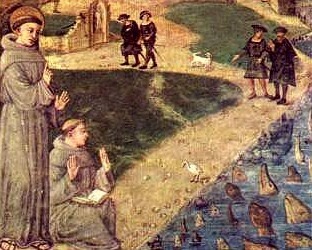So Jesus
said again, "Amen ,
amen ,
I say to you,
I am thegate
for the sheep.
All
who came before me are
thieves and
robbers,
but the sheep did not listen to them.
I am thegate .
Whoever enters through me will be saved,
and
will come in and
go out and
find pasture.
A thief comes only to stealand
slaughter and
destroy;
I came so that they might havelife and
have it more abundantly."
I am the
but the sheep did not listen to them.
I am the
Whoever enters through me will be saved,
A thief comes only to steal
I came so that they might have
Periodically, I suppose, every one of us encounters a
shocking, hard reality that threatens everything we thought was certain. One person
has lived modestly, never indulged in alcohol or tobacco, but one day a doctor tells her, "Your cancer is terminal." Another works hard, lives honestly, pays his share of taxes and bills; and retiring, discovers he will live out his days in poverty.A third lives in a homogenized political society and discovers the world
beyond her boundaries has invaded with tanks and artillery and destroyed everything she ever knew.
The fourth is an innocent man who has done nothing but good
for others. But when he presents his case the judge replies, “What is truth?”
Such was Jesus before Pontius
Pilate
Periodically I notice again that word we hear in our Eucharistic
Prayers, betrayed. On the night before he was betrayed…. What a shattering
word! It’s hard to probe its depths.
Throughout the Easter season the Church shocks us with the
beauty and fearfulness of Saint John’s
Gospel. His world is not cushioned by Social Security, Medicare, insurance policies
or helpful police. It is a political world that veils its brutality in a sheer
fabric of politesse, a veil that Jesus and
his opponents rip to shreds in their struggle for souls.
When Jesus invites his
disciples to come
in and go out of his pasture, he is not offering
them one package of security among many. He is desperately urging them to come
with me now before it’s too late.
As I meet with Veterans in the Substance Abuse program I tell
them very bluntly,
“If you are not willing to do the spiritual work of healing, you will not survive. You must learn to speak the truth, listen to others, give more than you receive, and forget yourself.
"Medicines might help and the VA can give you some. Ideas are useful and we’ll teach you a few. But you must turn your life and will over to the care of God today. Tomorrow never comes."










